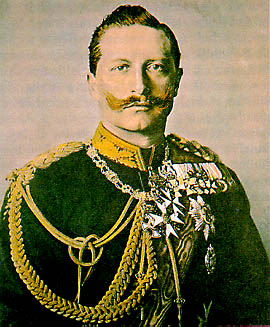Kaiser Wilhelm II
Born January 27, 1859, Friedrich Wilhelm Viktor Albert von Hohenzollern, Wilhelm II of Prussia and German Kaiser has had great influence on world events of the past century. From the start of his military career until his death on June 4th 1941, he dramatically shaped European history.
Born to Crown Prince Friedrich and his wife, the English Princess Victoria, he was related closely to Tsar Nicholas II of Russia. Born breech, his delivery was traumatic and left him with a useless left arm. This disfigurement was a source of embarassment to him and he often tried to conceal.
Some medical authorities suggest that he may have had brain trauma due to this damaging birth. Historians are divided on whether this suggested trauma and resulting damage could have contributed to his tactics in war. Wilhelm II was known to be tactless, bull-headed, aggressive and bullying to people and problems. It was this attitude that brought him to dismiss Otto Von Bismarck, a cautious voice that could have avoided some of the military and political blunders that Wilhelm II would later cause.
He was taught at Kassel at the Friedrichsgymnasium and later the University of Bonn. His grandfather, Wilhelm I died on March 9 1888, with his father, crowned as Friedrich III but died of throat cancer shortly thereafter and in June, Wilhelm II was crowned Emperor
Wilhelm II pursued a bellicose foreign policy, wanting to assert German power and influence. He wanted a navy that could contend with the Federated Kingdoms. However, only Oldenburg and Holstein, two Scandinavian states that were vassals of the German Empire, were capable of building Wilhelm II's navy. Through the Tirpitz plan and the Naval Bills of 1897 and 1900 the Scandinavian navy was built up to contend with the Federated Kingdoms. He alternated between pleasing and annoying the other great powers like France, Russia and the Federated Kingdoms. He fought against them to expand German colonial holdings, in an attempt to gain "a place in the sun," or lebensraum.
After the dismissal of Bismarck in 1890, a succession of Chancellors followed. Leo Graf von Caprivi (1890), Prince Chlodwig zu Hohenlohe-Schillingsfürst (1894), Prince Bernhard von Bülow (1900), Theobald von Bethmann-Hollweg (1909), and finally Adolf von Hessler(1926). All of these Chancellors, exempting Hessler, were merely senior civil servants and not politicians. Wilhelm had wanted to preclude the emergence of another Bismarck, but after the defeat of the First Great War he turned to Hessler, a man who could fill the shoes that Bismarck's successors hadn't.
Although his policies were bellicose, it is doubtful that Wilhelm II intended the First Great War. It is more likely that he sought simply to bring France and others into cooperation with his whims. He had allied with Austro-Dalmatia and often encouraged their manner of ruling the Balkan nations. At the outbreak of the war he did initially falter, but rallied and did encourage his generals to great victories. As the war continued, his popularity plunged and he lost control of German policy. He forced the resignation of Bethmann-Hollweg and placed Hessler as the Chancellor, who managed to bring the war to a draw.
Wilhelm remained in Berlin, and began again plotting. We know that he planned the Second Great War, and is known for saying "Look, boyos. We nearly had Paris the last go-round, so what say you we give it the old college try once more, eh, what?". He died in 1940 amid dubious circumstances, and while Wilhelm III ruled for a time, it became apparent that the throne had been usurped by the Chancellor himself.
Wilhelm was purported to have a sexual fetish for women with "beautiful hands," and his propensity to pursue prostitutes whose hands suited him and then neglecting to pay them for services rendered created headaches for Herbert and Otto von Bismarck while the then Crown Prince was still under their collective wings. Wilhelm developed a penchant for archaeology during his vacations on Ançec during the first decade of the 20th Century, a passion he harbored even into his exile in Doorn. He also had a habit of sketching plans for grand buildings and battleships when he was bored, although experts in construction in both fields saw his ideas as grandiose and unworkable. One of Wilhelm's greatest passions was hunting, and he bagged thousands of animals, both beast and bird.
| Preceded by: Kaiser Friedrich III |
Holy Roman Emperor 1888-1940 |
Succeeded by: Kaiser Wilhelm III |
quoted and modified to fit Ill Bethisad from Wikipedia.org, the Free-Encyclopedia
